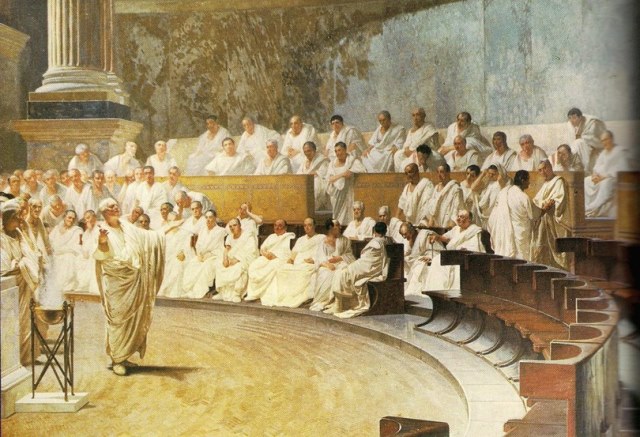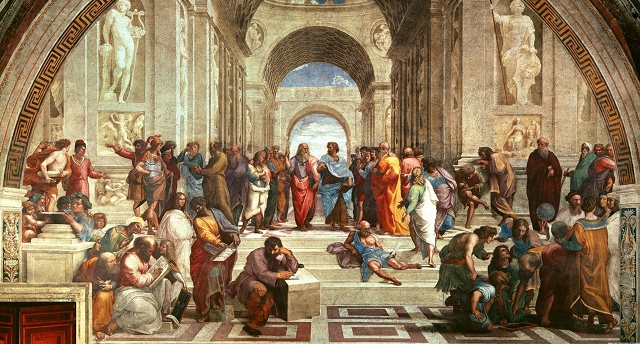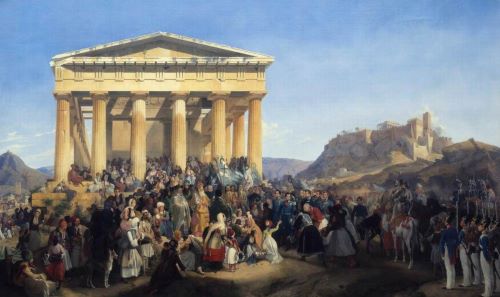Ancient Greece, known for its stunning architecture, rich mythology, and groundbreaking philosophical ideas, has left an indelible mark on Western civilization. From the Olympic Games to democracy, Greek culture has inspired and influenced the world for centuries.
The legacy of ancient Greece can be seen in everything. It has affected our political systems and educational institutions, and of course, our literature and art.
In this article, we will explore how ancient Greece has shaped and continues to shape the Western world. And as a result, leaving a lasting impact that will endure for generations.

A Brief History of Ancient Greece
Ancient Greece is one of the most fascinating and influential civilizations in world history. Its rich culture, scientific discoveries, and political innovations have left an indelible mark on the Western world.
Although the history of ancient Greece is long and complex, it can be divided into several key periods.
Mycenaen Era
The earliest period of Greek history is known as the Mycenaean era. It lasted from approximately 1600 BCE to 1100 BCE. During this time, the Mycenaean people, who lived on the Peloponnese peninsula, developed a powerful and polished civilization. They were skilled metalworkers and traders, and their culture was marked by a complex social hierarchy and a reverence for their gods.
Dark Ages
The next period of Greek history is the Dark Ages, which lasted from approximately 1100 BCE to 800 BCE. This was a time of great turmoil and decline, as the Mycenaean civilization collapsed, and many Greeks migrated to new territories.
Greek culture was marked by a lack of written records and a general sense of disunity during the Dark Ages.
The Greek alphabet, which had separate letters for vowels and consonants, was the first alphabet in the sense of the word used in Western culture. It was created after the Dark Ages and had 24 letters.
The first two letters of the Greek alphabet, alpha, and beta, are where the word “alphabet” comes from.

Archaic Period
The Archaic period lasted from approximately 800 BCE to 480 BCE. It was a time of great change and innovation in Greek culture. The Greeks developed new forms of government, including the city-state or polis. They made noteworthy scientific and mathematical discoveries.
This was also when the Greeks began to develop their distinctive style of art and architecture. These developments would later influence the Roman Empire and other civilizations.
The Classical Period
The Classical period lasted from approximately 480 BCE to 323 BCE and was the heyday of ancient Greek culture. During this time, the Greeks fought off the Persian Empire and developed their democratic government.
Additionally, they produced some of the greatest works of art, literature, and philosophy in human history. This was also the time when the great Greek city-states, including Athens and Sparta, rose to prominence.
Hellenistic Era
The final period of Greek history is the Hellenistic era, which lasted from approximately 323 BCE to 31 BCE.
This was a time of great change and upheaval. The Greeks came under the influence of foreign powers, including Alexander the Great and the Roman Empire.
Read: Interesting Facts About Alexander The Great
Nevertheless, Greek culture continued to flourish during the Hellenistic era, and many important scientific and philosophical ideas were developed during this time.
We Design & Develop Websites, Android & iOS Apps
Looking to transform your digital presence? We specialize in creating stunning websites and powerful mobile apps for Android and iOS. Let us bring your vision to life with innovative, tailored solutions!
Get Started TodayToday, the legacy of ancient Greece can be seen in everything from our political systems and educational institutions to our literature, art, and architecture.
Despite the passage of thousands of years, the achievements of the ancient Greeks continue to inspire and influence people worldwide. This makes ancient Greece one of the most important and enduring civilizations in human history.
Ancient Greece Philosophy and Its Impact on Western Civilization
The philosophy of ancient Greece is one of the most enduring legacies of this remarkable civilization. It has had a profound impact on Western thought and has helped shape many of the ideas and beliefs that we hold today.

Ancient Greek philosophy began in the 6th century BCE and continued until the Roman Empire absorbed Greek culture in the 1st century BCE. There were three main schools of Greek philosophy: the Socratic school, the Platonist school, and the Aristotelian school.
Socrates’ Impact on Modern Ideologies
Socrates founded the Socratic school of philosophy in the 5th century BCE. The legendary philosopher believed that the pursuit of knowledge and understanding was the key to a good life.
Additionally, he sought to expose the ignorance of his fellow citizens by asking them a series of questions. This was known as the Socratic method. Then, he encouraged them to question their own beliefs.
Socrates was eventually sentenced to death by the Athenian government for his unconventional ideas. But his philosophy lived on through his students, including Plato.
Plato’s Contributions to Western Civilization
Plato was the founder of the Platonist school of philosophy, which emerged in the 4th century BCE.
He believed that the world we see is only a shadow of a higher reality, which he called the world of Forms. Plato also believed that the pursuit of knowledge and understanding could bring us closer to this higher reality and that the purpose of philosophy was to free the soul from the constraints of the body.
His most famous work, The Republic, outlines his vision of an ideal society ruled by philosopher-kings.
Aristotle and Modern-Day Ideas
The Aristotelian school of philosophy was founded by Aristotle, who was a student of Plato. Aristotle believed that knowledge could be gained through observation and experience, rather than through pure reason.
He thought that the ultimate goal of human life was to achieve happiness, which he defined as a life lived in accordance with reason.
Aristotle’s work on logic, metaphysics, ethics, and politics profoundly influenced Western thought and laid the foundations for many of the scientific and philosophical ideas that we hold today.
The legacy of ancient Greek philosophy can be seen in many aspects of modern Western thought. The scientific method, based on observation and experimentation, is derived from Aristotle’s ideas about the pursuit of knowledge.
Democracy, which emerged in ancient Greece, is based on the idea that every citizen has a right to participate in the government. The ideas of Socrates, Plato, and Aristotle continue to inspire and challenge us today. This reminds us of the power of philosophy to help us understand the world and ourselves.
Read: Ancient Egyptian Inventions You Should Know
Ancient Greece Government and Connections to Western Civilization
Ancient Greece is often credited with inventing the concept of democracy, which has become a cornerstone of modern Western political thought.
We Design & Develop Websites, Android & iOS Apps
Looking to transform your digital presence? We specialize in creating stunning websites and powerful mobile apps for Android and iOS. Let us bring your vision to life with innovative, tailored solutions!
Get Started Today
Greek democracy was developed in the 5th century BCE and took many different forms over the centuries, depending on the city-state in which it was practiced. Here, we will explore the history of ancient Greek democracy and government and its influence on modern politics.
The Greek city-states, such as Athens, Sparta, and Corinth, were highly independent and autonomous. Each city-state had its own form of government and way of life, but they all shared a common culture and language.
Ancient Greece State Athens and Its Impact on Western Civilization
In Athens, the birthplace of democracy, the government was run by an assembly of male citizens who met regularly to discuss and vote on important issues. This system of direct democracy allowed every citizen to have a say in the running of the government.

In addition to the assembly, Athens had a council of 500 citizens, selected by lot, who acted as an executive committee. They were responsible for managing the day-to-day affairs of the city-state and overseeing the implementation of the decisions made by the assembly.
The council of 500 was also responsible for selecting officials, including judges and military commanders.
Another key element of Athenian democracy was the use of ostracism, a process by which a citizen could be banished from the city-state for 10 years. This happened if they were deemed to be a threat to the stability of the government. This allowed the citizens to remove unpopular or dangerous individuals from the political arena without resorting to violence.
The Greek State Sparta and Its Impact on Today’s Western Civilization
Sparta, however, had a very different form of government. It was a militaristic society in which the government was run by two kings, who were advised by a council of elders. Spartans had very limited political rights and were expected to devote their lives to military training and service.
Despite these differences, the idea of democracy continued to spread throughout ancient Greece. Many other city-states, such as Corinth and Thebes, adopted their own forms of democratic government.
However, democracy was never universally accepted or practiced in ancient Greece. Many city-states, such as Argos and Syracuse, were ruled by tyrants who held absolute power and were often appointed through force or manipulation.
The Influence of the Ancient Greece Government on Western Civilization
The legacy of ancient Greek democracy and government can be seen in many aspects of modern politics.

Citizen participation in government, central to Athenian democracy, has become a core principle of modern Western democracy. The concept of a written constitution developed in ancient Greece has also become a fundamental feature of modern government, especially in Western civilization.
In addition, the ancient Greeks emphasis on the rule of law and the separation of powers. This has significantly impacted modern political thought and practice.
Other aspects in which ancient Greek continues to impact the world include literature, art, science, and Technology. Most of the scientific and technological growth the world enjoys today first had its roots in Greece.
Ancient Greece was undoubtedly a civilization that left a profound mark on Western culture, and its influence can be seen in many aspects of modern society. From politics and philosophy to art and literature, ancient Greece’s legacy has shaped how we think and act in the modern world.
Asides from the aforementioned points, the Greeks’ contributions to science and mathematics have profoundly impacted modern society. The Greeks were the first to develop a systematic approach to scientific inquiry. Their discoveries in fields such as astronomy, physics, and mathematics laid the foundation for many modern technologies.
Before you go…
Hey, thank you for reading this blog to the end. I hope it was helpful. Let me tell you a little bit about Nicholas Idoko Technologies. We help businesses and companies build an online presence by developing web, mobile, desktop, and blockchain applications.
We also help aspiring software developers and programmers learn the skills they need to have a successful career. Take your first step to becoming a programming boss by joining our Learn To Code academy today!
Put Your Tech Company on the Map!
Get featured on Nicholas Idoko’s Blog for just $200. Showcase your business, boost credibility, and reach a growing audience eager for tech solutions.
Publish Now










